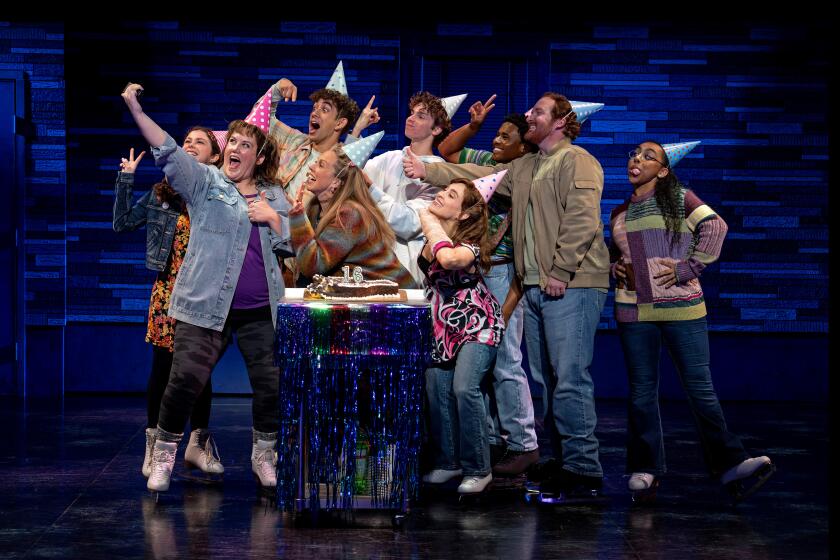Super Tuesday Makes for Great Theater
Most Americans don’t even vote, so it’s not shocking that most also seem to dismiss election coverage as tedious and irrelevant. Wrong!
Yes, nightly coverage of the marathon election campaign does drone on like distant Muzak--the obligatory photo opportunities, candidate posturing and pundit pontificating tending to merge into a single muted monotone.
For the record:
12:00 a.m. March 12, 1988 For the Record
Los Angeles Times Saturday March 12, 1988 Home Edition Calendar Part 6 Page 11 Column 2 Television Desk 1 inches; 28 words Type of Material: Correction
In Howard Rosenberg’s column Thursday, Democratic presidential candidate Gov. Michael Dukakis was incorrectly identified as the former governor of Massachusetts. He is the present governor.
Not on Tuesday, though.
The symphony of media and politics was at its rousing best this week when television covered the results of Super Tuesday’s maze of presidential primaries. It was fascinating theater.
To begin with, Super Tuesday committed TV news to large blocs of time devoted to a single topic, a rarity. Thus, everyone had an opportunity to speak conversationally, at length, rather than in 30-second sound bites.
I loved:
--The analysis. Co-existing with the usual mush was some outstanding work, such as Jeff Greenfield’s incisive comments on the other Democratic candidates’ reluctance to attack Jesse Jackson (because they have no legitimate claim of their own to his black constituency, Greenfield said).
--The statistics. Some of the graphics--especially CBS’--were incomprehensible. But NBC delivered some interesting stats contending that Jackson’s followers are more passionate about him than other Democratic candidates’ followers are about them.
--The regional voices. Guest Southerners such as columnist Tom Wicker and former Democratic national chairman Bob Strauss were refreshing sounds for TV news, which is usually a great homogenizer. When it comes to voices, television is the monolith, a business that celebrates standardization. If you’re a Texan in TV news, for example, you’re encouraged to drop the twang so that you won’t be associated with one area. That’s why people who read the news at stations throughout the nation sound like they were all born on the same block.
--The commentary. KABC-TV Channel 7’s new commentator, Rose Bird, wondered Tuesday if presidential candidates frequently speak of themselves in the third person because they instinctively separate themselves from their packaged candidacies. Bird categorized the campaigns as the “instant image that sells,” ignoring her own physical make-over in advance of her losing campaign to retain her seat on the California Supreme Court.
But her observations were founded in fact, as viewers found out. “The expectations for Jesse Jackson are much better now,” Jackson said about himself. And there was Democrat Albert Gore, talking about “the Gore victory tonight.”
--The happy faces. Tuesday was proof that political candidates continue to be our finest actors. Their ability to submerge their true feelings is remarkable.
There was Democrat Dick Gephardt, after seeing his candidacy possibly fall apart, appearing at a party for him in St. Louis. There he was grinning and shaking hands with supporters after winning only his home state of Missouri. There he was hugging his smiling mother, who did a jig to the music before introducing her son as “the next President of the United States.” After the “Gephardt” chants died down, the candidate declared: “I believe there are great days ahead in this campaign for Dick Gephardt.”
Third person.
--The TV smoothies. Probably no candidate understands how vulnerable the media are to manipulation better than Jackson, witness all the free TV time granted to his relatively low-budget campaign. When it comes to actually appearing on live TV, though, Republican Pat Robertson is the champ among all the candidates.
At least I used to think that until watching Gore recently.
A candidate needed a certain level of TV fluency even to reach Super Tuesday. But as Gore showed Tuesday night, and again Wednesday on the network morning programs, he now heads the list of the TV operators. On the screen you see someone who is handsome, impeccably groomed, forthright, earnest and extremely well coached. He speaks clearly, not too fast and not too slow.
In fact, even more than a presidential candidate, Gore reminds me of a TV anchorman. When he opens his mouth, I expect him to introduce the weather and sports.
--The TV dropouts. Sometimes you can tell more about the candidates from who is not on TV than from who is . Big winners usually love to be interviewed on TV and bask in their success. But the GOP’s big winner Tuesday--Vice President George Bush--turned down requests for live interviews Tuesday night and Wednesday morning, reflecting his reported strategy of trying to stay far in front by lying low and not making any blunders en route to the nomination. Live interviews can create blunders.
--The TV imagery. Support him or not, one has to be profoundly impressed when a black man such as Jackson fills the screen on Super Tuesday and is touted as one of the Democrats’ Big Three.
Another sort of positive imagery was visible on CNN, where the chief anchors were Mary Alice Williams and Bernard Shaw, who is black. ABC, CBS and NBC have no first-string female or black anchors.
--The ironies. We were back to the old wordplay Tuesday. Bush couldn’t be a wimp, and fellow Republican Bob Dole could not be mean. Did that mean it was all right for Bush to be mean and Dole to be a wimp? Has it occurred to anyone, by the way, that a little meanness may be a good quality in a President?
Meanwhile, it was all right to refer to former Massachusetts Gov. Michael Dukakis, a Democrat, as “governor,” but Robertson the former minister would bristle if you called him Rev. Robertson, even though it was permissible to refer to Jackson as Rev. Jackson.
--The wonderful moments. Shaw to Robertson about the Republican Convention: “Do you intend to raise hell in New Orleans?” Replied Robertson: “I don’t do that.”
More to Read
The biggest entertainment stories
Get our big stories about Hollywood, film, television, music, arts, culture and more right in your inbox as soon as they publish.
You may occasionally receive promotional content from the Los Angeles Times.










